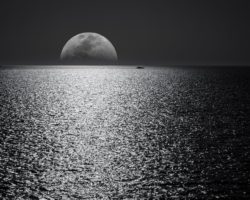
There was a second sun once, a pale sister who mused quietly over the earth when her older sister sank into her bed. You see the evening star there? It’s about the only one you can see anymore, unless you drive for miles and hike deep into the wilderness that still exists on the margins of man’s unending fire. This sun was far brighter. There are other pinpricks up there in that black expanse, too, millions of them, and she presided over them, magnificent in her size and detachment. From there she peered down at us, turning away in her slow survey of the earth and then again unveiling her mild light upon a torched world.
She floated there, the Sister-Sun, never speaking, lovely to lovers, monstrous to monsters, the cause of fits and dreams and delicious melancholy. By her the seas rose and kissed the land, adorning the beaches with shell and seaweed. When she turned away, you still felt her presence, like a shadow in the closet. Lonely, chaste, shy, she gazed upon generations of men, gilding the darkness with silver sheen. By her sister, the Sun, men woke and slept, driven to their daily destinies, but by her, the Moon, they numbered the seasons and years, planned their feasts and festivals, her eye steady and sage among the race of hurried men.
We touched her face, great men in tin cans landing upon her ancient surface, but like Gulliver upon the Brobdingnagian lady, we were too small and too close and her beauty was but barrenness.
Ours is a planet of emerald and sapphire, leaf and raindrop, and from her face we see our own, lying brilliant upon a black cloth.
But the bombs were there, upon that white-shrouded disc, that thriving, fecund globe. And they must go. It was decided. But where to put them, that they would be out of reach, or nearly out of reach? Where else?
I was young when it happened. You can read the histories to untangle the whos and hows and whys. The result is the same. I saw its round face split in two in a silence of fire, then crack into a dozen pieces, then a million, as flames overcame her. It was a delicate destruction, all in seeming slow motion, with the TV chattering about insurance discounts inside and cars honking down the road and me in the yard staring up at the deconstruction of half the light of man.
The bombs are gone now, so much radioactive dust floating in space. Peace, some say, as if man has forgotten how to be himself. But her luminous smile is gone, too, and the rhythm of her being and her wet embrace of this miracle rock.
The only light in the dark now is our own.